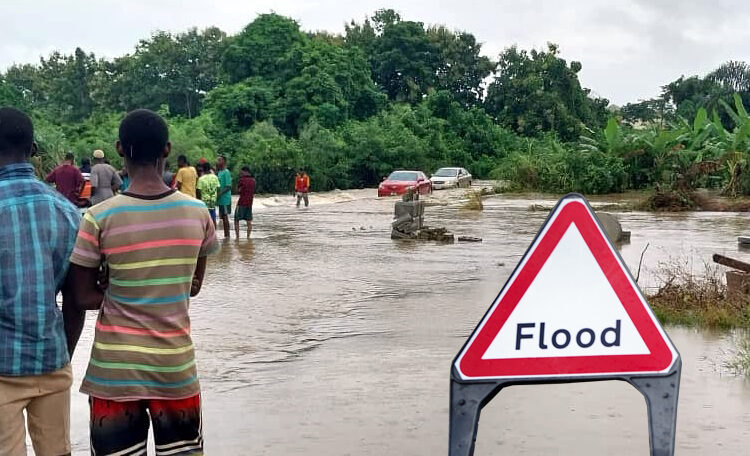Like clockwork, the rains return every year, exposing the same rot in Nigeria’s institutional fabric. Flooded communities, collapsed bridges, displaced families, submerged farms, and ruined livelihoods are no longer anomalies; they are symptoms of a country that plans for yesterday, reacts in the moment, and learns nothing. When the rain doesn’t stop, what collapses isn’t just infrastructure; it’s governance.
The Mokwa flood disaster on May 28, 2025, like the Maiduguri flood on September 9, is not about rainfall but a signal to governance and systemic failure. Predictable rainfall patterns exacerbated by climate change are not unforeseen disasters.
The Nigerian Meteorological Agency (NiMet) issues annual forecasts. Hydrologists offer early warnings. International partners publish risk alerts. Yet our federal, state, and local governments behave like victims of divine ambush, responding only when floodwaters sweep away lives and headlines demand attention. These disasters, just like others before them, further exposed the failure of systems, incentives, and lack of political will to respond quickly to save lives and properties.
At the root of this recurring disaster lies a broken emergency planning architecture. Agencies such as NEMA and state counterparts are underfunded, undertrained, and politicised. Their mandates are reactive rather than proactive, preventative, focusing on distributing relief materials and issuing press releases rather than planning resilient infrastructure or enforcing urban planning laws.
Disaster preparedness in Nigeria was reduced to photo-ops after the flood. In an effort to score a point, politicians put on a serious face and crocodile tears instead of a serious system of coordination, logistics, simulation, or prevention.
In a country that claims to have climate policies, federalism, and a Ministry of Humanitarian Affairs, no amount of rain should be destroying its cities in this 21st century. The Mokwa flood and the one in Maiduguri before were not weather crises. It is a governance crisis. Drainage masterplans are not implemented. Wetlands are converted to housing estates. Urban planning laws are ignored with elite impunity. Local governments, which should be the first responders, are hollow shells, stripped of capacity and legitimacy. And when disaster hits, the political class shows up with bags of rice, spaghetti and other sundry items. After the fanfare, the nation returns to its way of doing things and waits for another disaster to hit again.
The effects of these failures are devastating. Each flood season rolls back years of development. Food insecurity rises as farmlands are washed away. Cholera outbreaks follow displaced populations. Children drop out of school. Investor confidence dwindles. A country unable to manage rain cannot manage risk – economic, climatic, or institutional. It tells the world that we do not take the future seriously.
What’s the way forward? We must begin with a mindset shift. Preparing to avert a disaster is not charity; it is infrastructure. It is governance. It must also be treated with the same seriousness usually attached to defence spending or election logistics.
First, the government needs to enforce urban planning laws at all levels, and those who violate them should face the consequences. Drainage obstruction, wetland conversion, and unchecked urban sprawl must be treated as national sabotage.
Secondly, agencies responsible for disaster control and urban planning and the state and national assemblies, should align national development plans with climate adaptation. Nigeria’s budgeting, public works, and housing policies must internalise the risks of extreme weather. Rainfall is now a national security threat; our institutions must reflect this.
All the above are on the part of officialdom. On the part of the people, corporate and individual, there is a compelling need for attitudinal change that requires conscious discipline. Waste disposal habits among the people leave much to be desired. The attitude of emptying wastes into the drainage channel with the belief that the flood will wash them away is, in our opinion, saddening because when the floods come, those wastes block channels and divert flood water on the streets and homes where they are destructive and, as in Mokwa and Maiduguri, cause avoidable loss of lives and property.
We appreciate that floods are a result of natural phenomena. The rains and storms must come. Even in developed climes like the United States of America, the effect is often more devastating, as was experienced recently in Texas. The complaint was that the agency failed to give early warning signs, not that the people blocked the channels with their wastes.
We are persuaded to argue that what is required is a concerted effort by all concerned, government and the governed. When the rules are made, they must be obeyed.
We are not advocating for setting up new agencies or organising donor-funded workshops—those are already in place. We call for political seriousness and personal discipline on everyone’s part. Flooding is no longer an annual surprise. It is a system failure that exculpates neither the government nor the people. We are all guilty of permitting, excusing, and normalising bad behaviour until the next disaster strikes.





